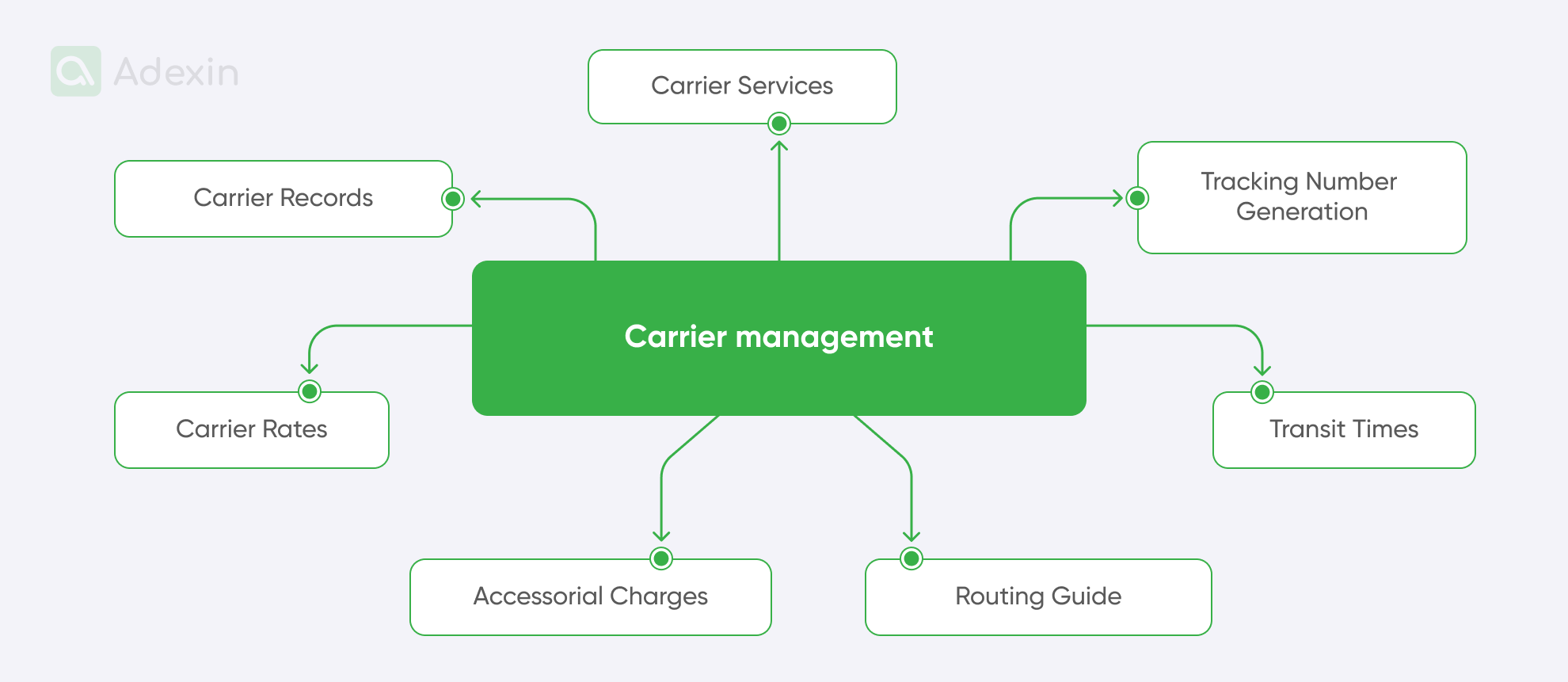In modern logistics, transportation, and the supply chain, there is no room for gaps in planning, scheduling carriers, or poor route forecasting. Everything should be as accurate as possible to ensure overall efficiency. But suppose sometimes it isn't likely to ensure a certain level of efficiency due to a lack of proper skills in place or external events. In that case, you should still be able to act on ongoing events to provide fast troubleshooting. And even if you're a small or medium-sized business, you should be cautious in your business management like larger companies.
In this article, we explain a bit more about how to manage your carriers and what impact it can have on overall operations. Here, you'll be able to gain more substantial knowledge about certain operations in transportation that are interconnected with all-over operations in the supply chain and logistics. We reveal information about COTS solutions and transportation custom software development as one of the two ways to gain control over your carriers.
What is carrier management?
At the very beginning, it's crucial to give you a sneak peek into what carrier management is all about. While it might be obvious to some readers, here we explain what carrier management is and determine the key features that this statement should combine.
Explaining briefly what carrier management entails, we can directly refer to the complex process of carefully selecting, contracting, and supervising carriers to ensure a smooth and efficient transportation system. This comprehensive approach includes the meticulous evaluation and selection of carriers, contracting, performance monitoring, and problem-solving. We emphasize that the ultimate goal is establishing a network of reliable carriers capable of meeting transportation needs at a reasonable cost structure. Yes, costs play a crucial role. Therefore, carrier management is often based on a software solution featuring many functions that can save money in an organization.

Here are some selected functionalities for carrier management software:
Carrier records. A complex list that includes unique carriers that are the solution to your shipping planning.
Carrier services. Various shipping services and modes (e.g., intermodal transport, last-mile delivery, just-in-time delivery, or any sea, air, or ground shipping).
Tracking number generation. Creating tracking numbers and digital Proof of Delivery to allow all stakeholders to keep an eye on shipments.
Carrier rates. An entire rates overview for your specific carrier contract and customer rates (rates that reflect what you charge customers).
Accessorial charges. The system can automatically add required charges to the shipment of your choice (e.g., fuel surcharges).
Routing guide. The system can measure geographical data that describes the area for which each service is provided.
Transit times. Functionality is connected to the Tracking Number and indicates the estimated delivery time (ETA). It is typically differentiated by service level and geographical location.
What are the carrier management processes?
Despite carrier management being based on a software solution, an external process is connected to managing carriers.

Here are the four main pillars of the carrier management process:
Selection and qualification. At this point, you need to identify transportation needs and conduct market research. Later, a process for evaluating carrier capabilities and establishing selection criteria needs to be implemented.
Contracting and negotiation. Here, you define contract objectives with carriers. Deploying comprehensive terms and conditions, negotiating prices and commitments, and obtaining legal approval are crucial.
Performance management. During the entire process, you need to monitor carrier performance. There is a huge demand for resolving problems quickly, conducting regular reviews, and using data for continuous improvement.
Relationship management and compliance. In any business, it is important to build positive relationships with carriers through effective communication. You must dive into conflict resolution and collaboration, ensure regulatory compliance, manage risks, and conduct regular audits for continuous improvement.
How does a carrier management system help your business?
Carrier management systems can deliver many advantages to your operations. We have prepared those that will have a tangible conversion for your business in the most positive manner.

Let's look at the main advantages:
Cost savings. Optimize transportation costs by selecting competitive carriers, negotiating favorable rates, and improving overall operational efficiency.
Improved service quality and reliability. Selecting carriers with a proven track record leads to increased customer satisfaction. You can also reduce transportation times and improve on-time delivery.
Improved operational efficiency. Streamlining transportation processes can help you reduce delays and minimize errors through effective carrier management. As a result, you'll have smoother operations and increased productivity.
Risk mitigation and compliance. Assessing carriers' compliance with regulations and safety standards helps mitigate risks to operations. It is where you'll reduce the likelihood of disruptions or compliance issues.
Better supplier relationships. Fostering positive relationships with carriers leads to better collaboration. Here, you can get better communication and greater trust. Frankly speaking, it will result in better service levels and long-term partnerships.
Greater flexibility and scalability. Adapting to changing transportation needs and market conditions allows companies to scale their operations. Everything is based on fluctuations in demand, so expand into new regions and capitalize on growth opportunities.
Improved visibility and control. Carrier management systems provide insight into transportation operations. Here, you enable proactive decision-making and rapid response to issues through monitoring.
What is the best-advanced traffic management system?
As mentioned in the beginning, there are two ways of carrier management based on software. You can use a commercial off-the-shelf software (COTS) solution or choose custom software development services. In both cases, you get advantages that can help you manage your business. Nevertheless, custom software development is more suitable for providing the most out of the system to support your operations. You can access many customized features and rely on experts' knowledge to guide you through each development stage. They will also be able to provide you with ongoing assistance for future development and troubleshooting.
Over the years of our activity, we have developed many solutions for our clients such as an AI-powered parking management system, where all solutions are automated and synchronized in real-time. Or, for example, the truck owners assistance application, allows you to track time and documentation in real-time. That is, custom software development is good, it provides only the necessary functionality with the possibility of scaling.
Need help with custom software development for your transportation business?
Learn how we can help you
Explore moreThe benefits of custom software development services for carrier management seem obvious. If we are talking about a traffic management system, then such functionality can be built into the operator's management software. This functionality is quite often not included in COTS solutions.
We outlined the benefits of a traffic management system built into a carrier management solution:
Effective planning. Traffic management facilitates efficient planning by coordinating and monitoring transportation modes and services. It provides optimized routes and, of course, minimizes delays and associated costs.
Real-time decision-making. Integration of traffic telematics systems enables real-time decision-making. These systems provide data on vehicle movement characteristics such as position, speed, and acceleration. It can enable rapid adjustments to optimize transportation resources.
Improved coordination. With traffic management built into carrier management software, companies can seamlessly coordinate transportation activities. It ensures efficient use of available resources while meeting customer requirements and minimizing overall supply chain disruption.
Optimized traffic flow. Traffic management goes beyond carrier operations to include managing traffic flow on highways. This optimization ensures adequate road space and operational speed. In that way, the solution is contributing to overall efficiency and safety.
Cost minimization. Effective traffic management in carrier operations minimizes costs associated with delays and inefficient use of transportation resources. Cost reduction contributes to increased competitiveness in the market.
Optimized global forwarding freight
Undoubtedly, by using carrier management, you can also benefit from optimizing global forwarding. It is often handled within intermodal transportation modes. Within carrier management software, you can choose the type of transportation that is most suitable for your customers. There are, of course, many other practices that can be deployed to improve and optimize transportation. Nevertheless, we want to narrow down the topic.
Carrier management software moves under one roof. Mostly, it is a solution based on the platform. Here are the benefits of using freight forwarding with a carrier management system:
Global shipping expertise. Freight forwarders navigate complex global shipping regulations. Here, you can ensure compliance and minimize the risk of costly errors associated with different regulations.
Carrier network. Well-established relationships with carriers worldwide allow freight forwarders to offer cost-effective and efficient transportation solutions using a variety of modes.
Cost savings. As cost management is most painful for carriers and shippers, with a platform for carrier management, you can manage forwarders optimize routes, and manage better returns operations with reverse logistics. You can consolidate shipments to minimize unit costs. In that way, they're providing cost-effective and efficient transportation solutions.
Platform benefits. The platform increases shipment visibility with real-time tracking. Here, you can get instant updates and notifications, no matter which mode of transport you have used. It contributes to better decision-making and proactive exception management.
Are you in search of a reliable tech partner?
Adexin can help with advanced logistics solutions
Contact usFinal takeaway
The carrier management system is a complex solution that can support your business, no matter the size of your company. However, using this system is much easier than choosing the right partner to help your business implement this solution in your organization.
At Adexin, we support transportation companies in supply chain and logistics with the implementation of carrier management systems. By understanding interdependencies across various industries, such as transportation, logistics, and supply chain, we know precisely what kind of results you may expect from carrier management. We listen to your needs as we believe that customer needs must be evaluated to provide you with reliable support. Contact us today to see how we can support your business.
